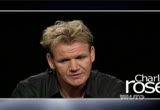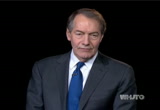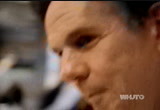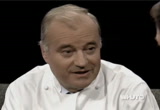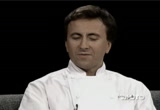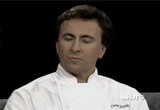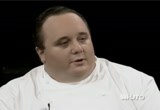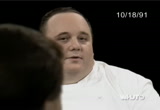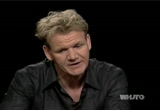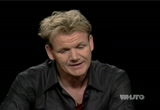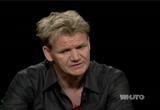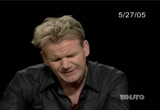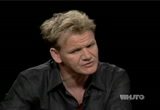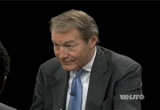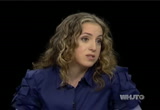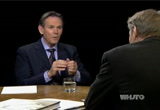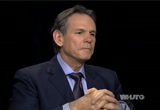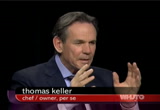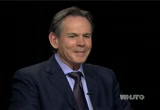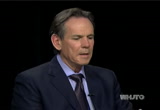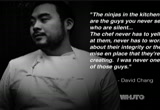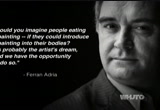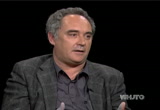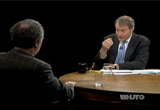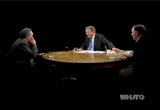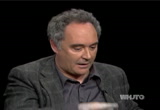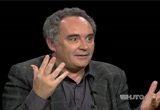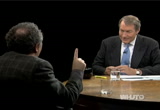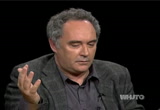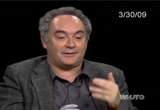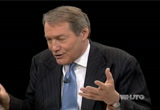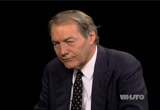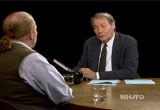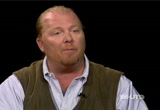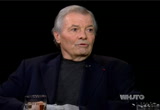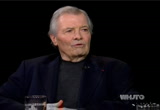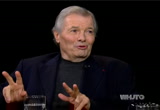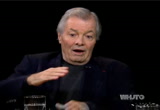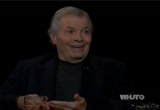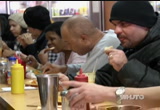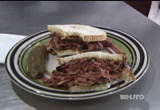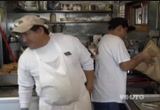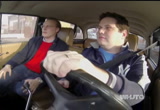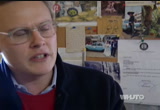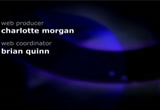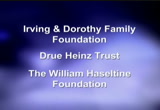tv Charlie Rose WHUT December 28, 2012 10:00am-11:00am EST
10:00 am
>> rose: welcome to the program. oscar wilde once said after a good dinner one can forgive anybody, even one's ons relations. in this season of food and family dinners, we look at some of the great chefs who have joined me over the last 20 years. and we conclude with a look at some neighborhood restaurants in brooklyn. what is it that most people don't understand about getting it right? >> good question. they take customers for granted and they don't have that level of confidence from day one and whether it's a restaurant or fine dining, you have to understand the word longevity and understand putting that confidence in the customers. the first visit is crucial but the second, third and fourth is paramount. not becoming too fussy and in a
10:01 am
way understanding the customers' needs where very few chefs ever get to put themselves in the customers' perspective. >> it used to be just you have no cook, be a very good chef and i thought i was the last -- when i started cooking i saw the last of this age of the great chef where you had to be the greatest technician. now it's not like that anymore because once you became the greatest technician you didn't have the ability to open up your own restaurant anymore. and things started to change. in the '90s there were five or six restaurants where if you wanted to learn about cooking you had to work there. and now that's not the case anymore. and i have just the utmost respect for the old school tradition, the history behind it and everybody that's done it the right way and it -- i have a hard time justifying my place with that world. >> cooking is a simple equation, no matter if it's fine dining at our level, casual dining or fast food. it's about product, about
10:02 am
execution. so, yes, you need to have that quality product and you need to have people who can execute it. so it's really trying to bring those two together, that strong team that has a common vision, a common goal and building relationships with the suppliers. and that's so, so important. make sure you have relationships and you're supporting the suppliers so they can continue to do what they do. >> you know, we do exaggerate in america all the time. so now we are locavore, you know local food and now we get totally crazy with organic to the point where i have been to restaurants where they practically come and introduce you to the carrot. that carrot was born on the 7th of may, we named it hilda. we can get exaggerated. too. >> rose: great chefs for an hour
10:04 am
captioning sponsored by rose communications from our studios in new york city, this is charlie rose. >> rose: let me start off. tell me what makes -- what makes a great restaurant? how do you -- >> well, what makes a great restaurant i don't know exactly. a great restaurant i think is where the owner and the chef gives all the love he can. >> rose: when does your day start? >> ooh, sometimes 8:00, sometimes 9:00, sometimes 7:00. >> rose: what's the first thing you do? >> oh, it changes a little bit.
10:05 am
i stop at the office for 15 minutes and then i go down and look if everything is holding and look -- >> rose: see i had this impression of all of you at the fish market at 4:00 a.m. everyday saying "these are the finest and the freshest" and you're poring over the fish, picking them up and deciding "only this is good enough for my customers, my clientele." >> oh, of course, we are a very aware and we do buy the best and i think what makes a great rest vaunt the cooking also. of course the service, the ambience, and for that we buy the best, we don't wake up at 4:00 in the morning because we finished at midnight every night. but we rely on suppliers from all over the country and new
10:06 am
york city also and they give us -- >> rose: everybody here has a passion for food, fair? you could not be the best -- >> yes. >> rose: and is there a passion to please? >> absolutely. if you don't this passion forget it, don't go in this work. >> rose: man, man, man, man. why? >> well, it was tradition, i'm trying to change the tradition now. it's changing slowly. i think if you go into their kitchens you'll see women and they're coming up through the ranks. >> rose: you see more and more female chefs in the kitchen? >> yes, and they work very, very hard, as hard as a man. when they become a chef the pressure might be a little bit too hard you become a chef when you're 30 or around that age and a woman may want to get married
10:07 am
or have children so it scrambles a bit the career. >> but that's not always the case. (laughter) >> rose: i know this sounds naive. do you cook every meal? are you there just watching? >> i watch. i cook many of them but definitely we have a lot of help. >> rose: but just the main course -- >> i work at station with the fish. >> rose: especially with the fish? if i went around, do each of you have one thing you would rather prepare than anything else? mark? >> i would say i really enjoy working at all. what i really is try to oversee everything and make sure you see everything that goes out so you catch mistakes that might occur before they hit the dining room. >> rose: like what? >> someone not doing something the way you want it. someone not looking as nice the way you like it. a kitchen is hustle and bustle, not like cooking at home. that's why many people -- >> rose: (laughs)
10:08 am
>> that's why people think they want to be chefs. they enjoy too cook. it's more of a -- it's like a sport in a sense. there's an energy the kitchen. there's team work, it's demanding and there's timing. everything for a table of six has to come up at the same time. >> i think it's more like war than a sport. >> rose: what do you mean war? >> well, off sense -- we talk about being in the trenches and it's highly pressured it's intense and doesn't stop until it's over. it's not like a sport where you can say i played two sets of tennis, i'm out of here. >> you work like a team. >> it's the same athletic ability of moving the pots, many times i feel like i felt when i used to play football. you're getting -- your adrenaline is flowing because tables are coming in and there's a famous person out there and a
10:09 am
personality out there. so it's an exciting profession. >> we all share the responsibility to motivate. >> rose: to motivate the people around you. >> exactly. and we need the pressure to be able to move on. if the restaurant -- we are not warmed up and when the restaurant is full then everything goes fine. >> new york's vibrant, boisterous exciting place to be and some of the best chefs in the world are based here. so i've always thrived on that level of competition and i got a e-mail from one of the chefs from new york last week back in the u.k. saying "chef ramsey, the chefs in new york want the meat off your bones." >> rose: (laughs) >> so they're getting ready. >> rose: you said have at he? >> yeah, i think -- you know, i'm 38 years of age, i'm far from my sell-by date and i'm very passionate about what i do and i -- i know what it takes to get it right. >> rose: what is it most people don't understand about getting
10:10 am
it right? >> good question. they take customers for granted and they don't feel that level of confidence from day one. and wlp it's a fine dining experience or a restaurant you have to understand the word long jeffty and understand putting that confidence in the customers. the first visit is crucial but the second, third and fourth is absolutely paramount. not becoming too fussy and in a way understanding the customers' needs where very few chefs ever get to put themselves in the customers' perspective. >> is it 50% food and 50% that? that whole other thing beyond food? >> it's a balance and, you know, understanding that sort of fine attention to detail, it's not just about the food and the decor. you pick up the phone and make a reservation. to the cost, to the ingredients, to the seasonalalty and not too fussy. nothing worse than walking through the restaurant, charlie, and seeing things that are finicky and precious that look
10:11 am
great but don't deliver that imagine that i can you have to get out of food. >> rose: i'm not one to ask this but is gordon spreading himself too thin? >> (laughs) i have just under a thousand staff and my staff are just absolutely bowled over at the thought of coming to new york and working here. >> rose: so you'll brick them here to get started? >> without a doubt and recruit. >> rose: but you have to bring your guys to make it start? >> without a doubt. we have to have that key truck churl management setup. but i set up a restaurant training skills center for waiters. so i'm always ahead of my game. the discrepancies in the food-- and i will never give a customer a chance to jump on that bandwagon-- and secondly i wouldn't do it unless i knew we had the stuff to pull it off. >> rose: steve wynn who you admire greatly is opening up wynn resorts.
10:12 am
at the opening about three or four weeks ago he has great chefs, probably would have loved to have had you. he has one rule, though: the chef has to be there. >> uh-huh. yes. >> rose: elaine decass has a number of restaurants. he's on your list of top ten? >> without a doubt. somebody asked me on the plane yesterday "if you're such a hands-on chef, who does the cooking when you're not there?" the same people that do it when i am there. >> rose: (laughs) >> how do they get where they want to go if they're not given the reigns from time to time. so i am comfortable with what we're doing and i can guarantee the level of perfection. but i said to this person who asked me that question, can i ask you a very important question and he said yeah, what's that? i said you've got the most amazing suit on. >> he said it's armani. >> i said how much? he said a thousand dollars. i said when you bought it did you ask if gorgio stitched it? >> rose: (laughs) >> and that's the same level of
10:13 am
peck answer the in my restaurant >> rose: you can train people to be as good as you are? >> of course you can and i don't have the insecurities about them becoming better or just as good as and if my team win three michelin stars themselves and i set them up in business, i'm over the moon. i'm complete. >> rose: tell me how you train them. because training people and understanding how to run a restaurant is a key to both these television shows. on the one hand you have an ae prynne thys thing where you're judging would be chefs and the other you're looking at restaurateurs and sayings -- >> failing. >> rose: your restaurant is failing and this is why. >> yeah. >> rose: tell me about training a chef. because you work at the side of some of the best in the world. >> yeah, i got my butt kicked in as well at the same time. >> rose: because you weren't -- the learning price? >> yeah, because that level of expertise, for goodness sake, is something you can't be give an script and read the following or it will happen so you have to live it. eat, drink, sleep and understand it.
10:14 am
cooking is like reading medicine. you never stop learning and you don't have a four five year stint in one good kitchen then it happens. you've really got to live it. i was very fortunate with marco white and the rue brothers in london but i wanted to become french. i wanted to get impregnated from an early age and understand their culture so i was in paris for three years and got my butt kicked each and every day. but it's the price you pay for that level of insight and perfection. >> rose: what did you have to learn about cooking? >> flavors. >> rose: flavors? like penal in the music say it's the sound? >> you connect with that flavor and i never wanted to be in a situation where i found an ingredient that i was intimidated by. whether it's a roasted porcini or the most amazing golden caviar from a sturgeon. i wanted to know how to craft and to perfect and understand it properly. >> rose: if you were going die tomorrow-- god forbid-- what
10:15 am
would you want for your last meal on earth? that was a question that photographer melanie due nay posed to 50 of the world's greatest chefs. their answers along with their portraits are compiled in this new book called "my last supper." she joins me along with four of the chefs. eric repair, marcus samuelsson, wily dufresne, and tom akins, chef and owner of tom akins restaurant. i am pleased to have them here. congratulations. this is this book is getting good reviews these are the questions: what would be your last meal on earth? what would you drink with the meal? would there be music? and who would be your companions? >> exactly. and people like marcus were salmon, salmon, salmon. so i thought what i am i going to do? how am i going to photograph him? i know, he's gorgeous, imup in .
10:16 am
(laughter) >> keep it simple. >> rose: but where did the idea comele from for you? >> well, the idea came -- i photograph many different types of people: politicians, authors, writers, but i have the most fun with chefs. they were willing to do anything and as i photographed them -- (laughter) >> and she means everything! (laughter) >> and as i started to photograph them more and more i realized they were open to anything and i started notice how they eat and they don't necessarily eat the food that they present in the kitchen. >> rose: they don't eat fancy. >> exactly. they really don't. >> rose: they eat simple. >> they eat simple. so i basically just decided to ask a question that they often are asked "what's your last supper on earth." >> rose: let me ask that question, last supper on earth. >> toasted bread, country bread, shaved truffle and a good bottle
10:17 am
of bordeaux. >> rose: what year? >> i would -- i'm fine with '82. (laughter) >> rose: even 2005 would be okay >> that would be my last supper. >> mine would be a fabulous piece of aged beef, four weeks old. >> rose: four weeks old? aged beef is that the magic time? >> yeah, very, very simply roasted with very nice homemade chips, preferably cooked in duck fat and then, again, with a nice bottle of red. for pudding i'd have probably my mother's rhubarb crumble with not traditionally made custard but in england we have this custard called birds custard which is tin custard and it's something i've always had from my childhood and i love it. even eating it cold is just the tops. >> rose: who would cook it? >> myself. >> rose: yourself. you'd cook it. would you prepare it?
10:18 am
>> i would prepare parts of it. >> rose: wlald you want? >> eggs, eggs, and more eggs. >> rose: you said scrambled softly -- loosely? what was the word you used? >> very loosely scrambled, the way my mother taught me to do it. >> rose: (laughs) me, too. and what else? >> there would be eggs, poached eggs with hollandaise, there would be a steak with somber haze in and scrambled eggs. basically breakfast, lunch and dinner. >> rose: you would not allow ketchup near your eggs? >> much to my father's horror i don't mind ketchup with my eggs. (laughter) >> rose: go ahead. >> i was raised on the west coast where we ate a lot of fish so i would love to have some grants.gov lox, simple crisp bread, mustard on top and a very very simple. it doesn't work that great together but it doesn't matter i would love a bottle of bordeaux. i know it would be good.
10:19 am
>> actually, when i asked marcus about the food he said "food doesn't matter." remember? >> it's such a big question, actually. so i think you would have so many other things to think about and for me what i draw from my swedish side, what i draw from the ethiopian side of me and i think salmon, lox, and then a good bottle of wine. >> rose: when you look at where food is going, is it headed any particular way? we all know every chef says it's about how good the ingredients you have. from alice waters forward. >> cooking is a simple equation no matter if it's fine dining at our level, casual dining or even fast food. it's about product and execution. you need to have that quality product. and you need to have people will execute it. so it's trying to bring those two together, that strong team that has a common vision, a common goal and building
10:20 am
relationships with the suppliers. that's so, so important. make sure you have relationships and you're supporting the suppliers so that they can continue to do what they do. people like diane sinclaire who does our butter in vermont. >> rose: your what in vermont? >> our butter. she has seven cows and she supplies with us butter and making sure we support her. keith martin who's in pennsylvania. he's our lamber. people like this are so, so important to what we do and the quality of what we do and without them chefs would be hard pressed to have the stature they have now. i hope the whole farm to table, farm to plate is happening now, working closely with parmers. in many cases, like french laundry, we have our own garden. we have almost three acres planted today so we're producing our own food as well. >> rose: fresh laundry will always have the deepest place in your start >> always. it's a place for me, which is imagine cam. which has a strong legacy from the previous owners and i hope
10:21 am
that continues because i know i won't be there forever and whoever takes it over from my hands i hope they continue that legacy and continue to build it as a great restaurant. >> rose: how often are you in the kitchen? >> as often as i can be. >> rose: but does the demand of all this and all this -- >> it's interesting, because when i opened, my life changed. i had a chef du cuisine in new york and a chef du cuisine and my life changed and i started to realize that no longer was the -- the old definition of chef accurate. the old chef last generation had one restaurant, one menu, one kitchen, they spent their whole time. the perfect example is andre. today chefs have many more students so we have to look at that and analyze it, be responsible to it and say okay,
10:22 am
how can we impact our team? how can we hand down to them what we have? the opportunities that we have? what that means is writing a book, for example, jeffrey, who's our chef at bird flu shon wrote bird flu beauchon cook book. >> rose: if i mention three of them, you tell me what they share in common. >> there's five chefs we have working for us. what they share in common-- it's certainly common vision-- but it's the determination to go in everyday and do a little bit better than the day before. continuously progress and evolve the philosophy and culture that is so dear. >> rose: that's true about anything. >> exactly. and i don't think that's a great secret. >> rose: what's your favorite feel? >> that's an easy one. it's been asked several times. >> rose: i'm sure. i take no pride in the question. >> roasted chicken. >> rose: mine too! >> one of those things that creates so many -- i think it stirs so many emotion in me.
10:23 am
>> rose: as roasted chicken. >> exactly in the purest form. that's exactly what i would say even though i'm -- i love fish but roasted chicken -- it takes me to places where i've been before. it's an emotional thing. food has reference points and food like roasted chicken has reference points. >> rose: celebration, wedding, birth -- >> and that touchs you inside. that's what i love about food like a roegsed chicken or mashed potatoes. sometimes oatmeal. >> rose: you can get up in the morning and somebody makes oatmeal better than you've ever tasted before. >> exactly. >> rose: what do you want your legacy to be? >> i hope my legacy one that has been impact to feel a lot of different people that has enabled them to learn something from me, to help them do their jobs better. from a guest point of view from
10:24 am
our guest i hope that they have memories >> you remain me of a coach. you're like john wooten. you have a philosophy of life. it could be about football or cooking or any aspect of it. it is what kind of principles will get there. you say about cooking don't give up is a central tenet of success as a chef. don't give up. >> but there are so many parallels with sport franchise. as a young player, as young cook i was in the mix for 30 years then your knees start to go, you can't stand on your feet for 15 hours a day so you pull a way and you start to mentor. you start to give more back to that young steam they can do again what you've done. >> my dad never envisioned any of his children doing that.
10:25 am
i didn't want to sit behind a desk. this was 1999 and i was like, well most of my friends miserable at their desk jobs working in sweet or law and i'm going to pursue something that i at least enjoy doing, and that was cooking. >> rose: you liked it? >> i liked it. >> rose: what did you like about it? >> that you could work with something and get better at it and sort of just taste and -- you're creating something, using your hands. it's something that was just the direct polar opposite of what i was doing in college or what i was being groomed to do which i had no idea. cooking was something i felt i had had an honor in. it was like a real craft. if i had more dexterity i would have been like a -- i don't know, a cooper or something like that. >> rose: or a surgeon. >> yeah, a surgeon.
10:26 am
>> rose: (laughs) >> so you're -- you went about cooking and you got a series of jobs, including japan. >> yes. >> rose: and how influential was that? >> it was life changing. life changing. >> rose: life changing. >> yeah. i had a small stint teaching english in japan and i promised myself i'd go back to japan to do it right and to absorb the food culture and to stay there almost a year. it changed the way i viewed food. food didn't have to be good just for the fine dining level and that was one of the misconceptions that i had about food that you could only eat well in fine dining restaurants in new york, for instance. and in japan from cheap restaurants to very fancy chai secchi restaurants everything was cooked with so much passion, a very ingredient driven and it was good. everyone cared about food. it was a cherished thing. >> rose: they love food in japan
10:27 am
and they practice the art of cooking to a high level. >> rose: it's amazing. people that travel japan need to stay there longer than a week. they need go there for at least three weeks and soak up tokyo and other cities, osaka and tokyo. there's a lot to learn, particularly about food. >> rose: one of the things that's clear about you is that you have a passion for chefs, period, and you want to see that chefs get their due and have an opportunity too spread out. if you had your druter there is would be a lot more restaurants in new york and a lot more good chefs working. >> it's too hard to do it on your own. it used to be just enough to be a good chef. and when you started out cooking i felt like i was the last -- when i started cooking i saw the last of this age of the great chef where you had to be the greatest technician. now it's not like this that anymore because once you became
10:28 am
the greatest technician you didn't have the ability to open up your own restaurant anymore. and things started to change. in the '90s there were five or six restaurants where if you wanted to learn about cooking you had to work there and now that's not the case anymore i have just the utmost respect for the old school, the tradition, the history behind it and everybody that's done it the right way. i have a hard time justifying my place with that world. >> rose: why is that? >> because i don't feel like i've paid my dues. >> rose: i know you don't. >> and that's hard for me. i take it with a grain of salt sometimes -- not sometimes, all the time. because i feel that jean george, thomas keller and even the people that -- there's a lot of cooks out there that i feel are superior to me or much more talented that don't get press coverage or the recognition that they deserve and i feel that for whatever reason it just happened
10:29 am
to me. i speak my mind or i do this or that. it's not like i'm trying to get attention or anything like that. we're trying to serve good food. we're trying to treat our people right. >> rose: not trying to attract attention? >> just trying to do what we believe in. >> rose: let me pursue another idea, not authenticity but originality. that's what people say about you. you've taken these things and you have made it original. you have created by the things that you choose to do. >> that's another thing i have a hard time processing. i think what wily dufresne does is original. >> rose: he's a big fan of yours. >> i love what he does and i think he was a trailblazer, he allowed us to do what we do and i think what we do is just repackaging stuff. that's the way i look at it. >> rose: that's -- that's what
10:30 am
you any. >> i feel like we're not doing anything ground breaking. we're just trying, again -- i tell guys like i told -- i don't -- i just feel like let's make something good, let's do it the right way. the right way is let's be respectful to the product. let's cook it with technique. let's try to do what we have with our limitations. let's try our best regardless and even if it's a bad dish, if someone doesn't like it, i want that guest to be like at least they tried their best. i might not find the food agreeable but i can see how much love and passion was put into the food. >> rose: what does it mean to you to see this all the time. best chef in the world sometimes called an artist like picasso. what does it mean --
10:31 am
>> it's a horror. it's something terrible because i don't feel like the best chef in the world. but when others keep saying that you are something, i guess you have to live with it. yesterday i was at the culinary institute of america and i gave a conference for 2,400 people. i realized that i am like for many young people to make sure that i will always be there for them and i will be a good example. you cannot let down to a young student 15 years old and then he sees you as honesty, the total thing in your kind of line of
10:32 am
work and that's a big pressure. >> rose: let me talk about your relationship. you first knew about him when? >> oh, i was 15, 16 years old and i work in barcelona and i kind of try to go to a school and i was always working and never went to a school and i spent a summer working in a little restaurant in brussels in the town where it's located and cooking paella for the tourists. >> rose: you want to transform food. transform food. but you also want to satisfy four levels of pleasure: hunger, senses, emotions, and intellect. >> ( translated ): it's the most
10:33 am
intense spirit in the world. >> rose: one of them. >> ( translated ): no, no, the most intense because you can measure the intensity in many ways. it's just another creative moment that we'll use the five senses. none. music is beautiful but it's only the ear. but first let's talk about the senses at the physical level. painting is only the eyesight. eating is really all the senses. when you eat, you smell, you listen, you hear, you taste, the
10:34 am
feeling in the mouth, obviously the heart, obviously the conversation. eating the something really complex. but because we eat everyday we don't want to see it as something complex. it's a little science fiction. for a second food -- imagine for a second that food will not be a need, a physiological need. what is your relationship with food then? because we really need to think then eating and breathing is the only two things from the moment we're born until the moment we
10:35 am
die. so really it's a very complex relationship. >> you can tell the world about the complexity behind eating. >> ( translated ): yeah, you know, the people that are watching us right now, you know we can be telling them about the backstage, what happened behind, but i am only interested in happiness. when you see a painting, it's the emotion. why is it become something emotional. and why you will feel very emotional when you are in front of a gastro no, ma'am cal experience. this is something like only one can tell himself. it's people that when they are in front of a picasso painting
10:36 am
they cry. you saw the people that they walk by and without even looking and it's the same painting. >> rose: and that's the way you have to approach food that individually it has to touch you as an individual. >> ( translated ): we are in a moment where everyone is the ones that they're going to be charge n charge of what is going to be happening. because people are the ones that they're going to be deciding what is really emotional. especially when we are talking about avant-garde cooking. because avant-garde cooking is no reference. it's something very visceral, very animal. and you feel it when you eat a
10:37 am
good meal, a traditional meal you have a previous reference with something you had before okay, this was system to the thing i had in paris or the thing i ate in barcelona. you have her reference. but when you have in front of you a dish of avant-garde cooking you have no rest. you think new another planet. and nothing like eating in the western world. not the thought, the spirit behind the food. it's a new world.
10:38 am
so when you are there and you have to dish in front of you it's only between you and the dish you have in front of you. because the first time you've been to japan you have no reference the tea ceremony in japan is to cry. but you need to be willing to get into that special world. because if not you may think that that tea ceremony is something very superfluous and avant-garde cooking is that. >> rose: the word "molecular" comes up. you don't like that? >> i don't like that because when i hear that term molecular it's a very cold image about cooking.
10:39 am
i don't like the name because it's really the contrary for what i want to tell the world. >> rose: happy, warm, touching all the senses. what word would you use to describe the cuisine that you want to create? >> ( translated ): finally he sees clear. this is an important moment because it took me 25 years to come with a name for my cooking. the cooking i do it's called el bue, no other names. >> rose: so that word describe what is you do?
10:40 am
>> ( translated ): yes, because it is the easy version because the difficult version is way to difficult and complex to explain. >> rose: so what do people that cook and don't have either knowledge or the time necessarily to do what you do or people that bourque to you do which is to find these ingredients. look at what you brought me today. a little present these are the first -- >> first cherries from upstate new york i don't need to import these ingredients. >> rose: that's exactly what he's done in copenhagen. that's no what nordic cuisine is. >> which is why it tastes so different because none of us are familiar with that palate of ingredients. >> rose: what is slow food? >> it's a reference to a countermovement of fast food. it started by out-of-work communists in italy the day they built a mcdonnel's on the spanish steps in rome.
10:41 am
they came down to raise the flag against fast food. what it represents is that as we move forward into the future ideology becomes second to philosophy and food is produceed in a way that more represents getting it to the market in the right shape as opposed to celebrating the odd appletor very geospecific peach that grows in eastern washington. so they're trying to say don't let our biodiversity shrink to make it more efficient. let's keep biodiversity as an important thing and help promulgate and keep these things going by supporting them, creating a market for them and helping to get to the place. so that's what slow food is. >> the fact that you're no longer in the kitchen much, that you're an entrepreneur, does that mean the restaurant is not really yours anymore? >> no, as alain ducass once told
10:42 am
me, "i 'nam all the kitchens all the time." ducasse. and he's got more than me. >> rose: this is a guy who survived a plane crash, by the way. >> i would say my philosophy and the people i have trained to work with me represent exactly a group effort of what we think a great restaurant should be. my influence is there a so they wouldn't put things on the menu that i wouldn't approve of and i go to all the restaurants in new york at least two or three times a week. >> rose: two or three times a week? >> for a couple hours. i have eight in a new york. >> rose: so you're for the restaurant two or three times a week? meaning you're in each one two or three times a week? >> absolutely. >> rose: when was the last meal you cookd? >> last night. i cooked veal and pork meat balls for my in-laws with a sunday gravy. >> rose: veal is a meat.
10:43 am
>> i served it with fennel salad though. >> rose: meat balls and veal? >> and spare ribs. the ribs that go in a sunday ragu make the whole thing. you just need two little riblets as big as your thumb. >> rose: other than being simpler how has cooking for you evolved. >> when i did that book, the conundrum for me was do i leave those recipe it is way i did them 30 years ago, 35 years ago to show a moment in time or do i make it so it's it was more work than doing a book from the beginning. the more olive oil, less butter, much less cream, the time of cooking has changed a great deal in vegetable. so, yes, it has changed. >> rose: how often do you cook? every night? >> basically everyday, everyday.
10:44 am
>> rose: does she cook for you as well? >> yechlt and when i come into the kitchen i say to my wife of 45 years, "darling, what do you think?" she says "don't touch anything." (laughter) >> rose: because most people when they meet chefs they say "well, do you cook at home?" of course you cook at home. >> of course, of course. and for me i haven't had restaurant in quite a while. my recipe are done with myself. i got an idea, i go to the market, write it on a yellow pad start doing the recipe. i gave it to noor with my assistant for 27 years and she retyped it. >> rose: that's the recipe. the have the products changed, are they better? >> no question. when i came to america 50 years ago there was no leek, there was no shallot, there was only one type of shallot, there was
10:45 am
iceberg lettuce. i remember going to fifth avenue going to d'agostino know brothers, good market and they say "we're out of mushrooms." they say "aisle 5." that was canned mushroom. you had to go to a fresh store to get mushroom in new york. now it's an embarrassment of riches. there's 20 different types of salad, 15 types of mushrooms. the supermarkets have never been as beautiful as they are today in america. >> rose: they've never been as good. >> no. >> rose: and do you still spend -- people who cook always say to me the cooking the s better. the fresher the vegetables, the better. >> absolutely. >> rose: the better the product, the better result. >> there is no question about it but we do exaggerate in america all the time so now we are locavores, we have to eat local food and i would get totally crazy with an organic food where i've been to a restaurant where they practically introduce you
10:46 am
to the carrot. that carrot was born on the seventh of may, her name is hilda. it can get exaggerated, too. >> rose: you use less butter? >> yes, much less. >> rose: and more olive oil? >> yes, more olive oil and even other type of oil. >> rose: is olive oil good for you? >> yes. >> rose: but butter is not. >> everything is good for you. it depends on the proportion. >> rose: and we should eat less, shouldn't we? >> i could lose a few pounds. >> rose: i could eat less news. i think that's the quito being able to say this is enough and americans especially. >> rose: i worked for howard johnson years ago for ten years and i remember at that time early 1960s i would see soda that was in the 12 ounce, the biggest one was 12 ounce i'd say this is crazy. now we get to 45 ounce soda and mammoth plates of food. it's too much. >> rose: i've never known why you went to work for howard
10:47 am
johnsons because you had been, if i remember correctly, you'd been de gaulle's chef, which i referenced. >> yes. >> rose: what was he like? >> well, i work under three governments under the time -- under the fourth republican front. the government was changing at a rapid pace but you deal with the lady of the house and of course i show the president at christmas and otherwise, you deal with the lady of the house and you have to realize that at that time the work of the cook was very, very low on the social scale. any good mother wanted her mother to marry a child, a doctor, an architect. definitely not a cook. we are genius now. >> rose: what's the difference between a cook and a chef? >> well, the cook is the one who cooks that i do at home and the chef is the chief. so at home i am the cook. if i work in the kitchen and i have five six guys working from me -- >> rose: you're the chef.
10:48 am
>> some of new york's great food can be found outside manhattan in the glare of the bright lights. ever since this establishment by the dutch in the 17th century, brooklyn has been a place of immigrants. >> i'm one anybody in the dominican republic then i'm in yemen and the next minute i'm in old ireland. >> it allows some people to feel at home and other people to feel troubled. >> exactly. >> it's allows us to span the globe in a single day and it became clear to us that if brooklyn's official motto is "strength through unity" its unofficial one is "unity through food." >> the i try to take people to the neighborhood places that literally everybody in the neighborhood knows about it but somehow nobody else does. >> rose: damage from sandy is staggering. millions in the northeast struggle in the wake of hurricane sandy.
10:49 am
>> the ravages of hurricane sandy remain a real and immediate problem in brooklyn. >> we support each other. we do what we can financially for each other but right now being scattered, it's hard. >> but on the whole, residents have risen to the challenge and restaurants have played an important role. >> we started cooking chicken for the people in the projects that were still home bound. >> almost -- someone just almost got run over. >> oh, here you, go perfect. hipsters and their hipster baby. >> he's a licensed new york city taxi driver. he gives food tours and he was our guide for the day. >> let's go. so our first stop is a little
10:50 am
lunch counter. we're going to go -- it's certainly only jewish deli in the whole city that's closed for ramadan. so here we have to get brisket. so we get brisket on rye with gravy and a pastrami sandwich on rye with mustard. hey, how's it going? can we get a pastrami on rye with mustard, medium, please. >> wow, look at this. thank you. you can see how moist. dig in. >> best i've ever tasted. can we meet riyadh? >> sure, let's go talk to him. do you think places like this helps communities come together in a place like brooklyn? >> i think it does. here we are. muslim, running a jewish deli in
10:51 am
a caribbean african american neighborhood, we have jewish not that far on the eastern parkway and you have everybody coming in here together eating a unique dish for from unique people. >> rose: >> how do people learn about other cultures by eating? >> i guess food speaks for itself. you don't have to travel to the middle east or india or anywhere you can just eat the food. >> we just passed yemen -- >> a yemeni serving russian jewish pastrami and brisket --? >> in a black neighborhood neighborhood. >> in a black neighborhood. >> okay, we're going to get some roast beef and talk to eddie sullivan. >> that's the pure just dip.
10:52 am
the russo family from coney island, they would order it for years, people starting seeing it and hearing about it and all of a sudden they said this is italian irish fusion. >> cooked by irishmen invented by italians. >> cheese, onions, the hot beef on top. >> the area has really been flooded with first looking to help guys volunteering, different states and surrounding areas half a mile away had six feet of water in their business. >> eddie sullivan seems like a very generous man. >> he really is. really is. >> he's really trying to help out the local community. >> that's not rare. people do that -- these little neighborhood places, they're not
10:53 am
doing it for the publicity. it's not because pbs is filming on this it's because they're just different than their neighbors. this was the worst neighborhood in new york city 20 years ago when new york city was the worst city in the country and now they're doing much better. >> pies here? >> pies are here. steve's authentic key lime pie. fill and chill, please. >>sy can't turn that down. cheers. do you not like key lime pies? >> i don't eat them as much. >> what does the hurricane mean for you and the community? >> we've had -- it was an amazing outpour of volunteers.
10:54 am
they were here in droves just lining up ready to do work that was not very pleasant work to do they did more in one day than it would have taken us six weeks to do. >> it's very humbling and it's very -- it's touching to feel that kind of outpouring of effort and not just me, it's every business here. two tarts? >> yeah, two tarts. >> so we're glad we're back up and running. >> on the whole >> i think it depends on you who you are, if it's the best or the worst but it didn't leave you the same. the french said tell me what you eat and i will tell you what you are. it became apparent today that where you eat and who you eat it with is just as important.
10:55 am
75 Views
IN COLLECTIONS
WHUT (Howard University Television) Television Archive
Television Archive  Television Archive News Search Service
Television Archive News Search Service  The Chin Grimes TV News Archive
The Chin Grimes TV News Archive 
Uploaded by TV Archive on

 Live Music Archive
Live Music Archive Librivox Free Audio
Librivox Free Audio Metropolitan Museum
Metropolitan Museum Cleveland Museum of Art
Cleveland Museum of Art Internet Arcade
Internet Arcade Console Living Room
Console Living Room Books to Borrow
Books to Borrow Open Library
Open Library TV News
TV News Understanding 9/11
Understanding 9/11
